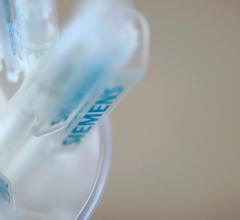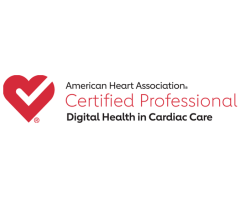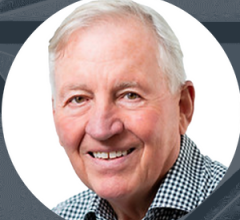
William O’Neill, M.D., Henry Ford Hospital, speaking at the announcement of the creation of the Cardiogenic Shock Initiative in 2016. O'Neill asked the same partner hospitals in the Detroit area to pool resources to create a COVID-19 study group to help speed the gathering of data in COVID-19 drug trials.
March 31, 2020 — Four metropolitan Detroit hospital systems and a leading research university announced a collaboration to bring large-scale novel coronavirus (COVID-19, SARS-CoV-2) drug trials to southeast Michigan.
Doctors from Henry Ford Health System, Ascension Michigan, Beaumont, Detroit Medical Center and Wayne State University are teaming up to form the study group. Doctors affiliated with the five organizations collectively treat millions of patients a year, which provides a large-scale study opportunity for potentially life-saving treatment options.
“The whole idea is we want to collaborate in the region, apply for the new trials and be part of discovering best practices and treatments for COVID-19,” said Henry Ford Health System interventional cardiologist William O’Neill, M.D., who organized the collaboration. “We’re going to be very competitive. We want to figure out how to optimally treat these patients, to establish protocols and systems so we can all do things effectively and, very importantly, to quickly track outcomes.”
Cardiologists Shukri David, M.D., from Ascension and Amr Abbas, M.D., from Beaumont, and emergency department specialist Brian O’Neil, M.D., from DMC are leading their respective health systems’ efforts, along with emergency department specialist Phil Levy, M.D, FAHA, FACC, from Wayne State University.
"This viral pandemic has no boundaries,” said David, chair of cardiovascular services, Ascension Michigan. “By combining the resources of our medical community, we will offer research opportunities that no one institution alone can defeat. Our efforts are stronger when we work together.”
Collaboration Already in Place From Detroit Cariogenic Shock Initiative
Their collaboration to save lives is not new. In 2016, led by O’Neill, the cardiologists joined forces for an initiative to lower the death rate from cardiogenic shock, a potentially fatal side effect of massive heart attacks. Together in the Detroit cariogenic Shock Initative, they showed a specific treatment protocol increased patient survival in southeast Michigan from 50% to more than 70%. The protocol is now the basis for the National Cardiogenic Shock Initiative, used by cardiologists to save lives across the United States.
When COVID-19 hit, O’Neill, medical director of the Henry Ford Center for Structural Heart Disease, reached out to the others and Henry Ford leadership. He suggested they use that previous collaborative experience to quickly mobilize against this new threat – and together bring randomized, controlled trials to southeast Michigan.
“We moved the needle on survival in cardiogenic shock for the first time in 20 years with our collaboration then,” said emergency department specialist Brian O’Neil from DMC and WSU, who is not related. “We hope to replicate that success on a much larger scale in our battle with COVID-19 today and support our colleagues who are on the front lines.”
Hope to Start COVID-19 Trials in Detroit Area Soon
The COVID-19 collaborators are working directly in support of infectious disease experts at their respective hospitals. They hope to receive National Institutes of Health approval to bring two specific COVID-19 trials to southeast Michigan:
1. Moderna’s COVID-19 vaccine: The company’s chief executive officer said Moderna may provide the vaccine to a few people, which could include healthcare workers, as early as this fall. A healthy volunteer received the first COVID-19 vaccine March 16. The company estimates it could take 18 months to make it commercially available, if the trials prove successful.
2. Takeda’s hyperimmune globulin: Using plasma from patients who have recovered from COVID-19, the company is evaluating a treatment that’s effective on other severe acute viral respiratory infections.
“Big research studies need time, but they also need a certain number of patients to prove the new treatment is number one: feasible; number two: effective; number three: safe,” said Dr. Abbas, an interventional and structural cardiologist who is the director of Cardiovascular Research Program at Beaumont Hospital, Royal Oak. “For us to reach that perfect scenario, we need collaboration on that level among our hospital systems.”
Once trials are initiated at health systems, participation takes place through the patients’ treating physicians.
“We hope our work here will last well into the future, should COVID-19 continue to be a threat,” said Levy, chief innovation officer of the Wayne State University Physician Group and assistant vice president of translational science and clinical eesearch innovation for Wayne State University. “By combining forces, we can marshal greater research capabilities to effectively test vaccines and treatments to combat this virus.”
More information on particular trials underway in the United States can be found at https://www.clinicaltrials.gov/ct2/results?cond=Corona+Virus+Infection&term=&cntry=&state=&city=&dist=.
First Large-scale U.S. Study on Hydroxychloroquine COVID-19 Prophylaxis Begins in Detroit
Watch an interview with O'Neill on the trials in the VIDEO: Trial Tests if Hydroxychloroquine Can Protect Healthcare Workers from COVID-19
FDA rejects Henry Ford system's bid for hydroxychloroquine approval
Find videos and articles on Henry Ford Hospital's cardiology program


 November 14, 2025
November 14, 2025 









